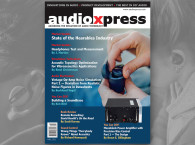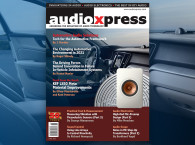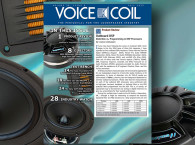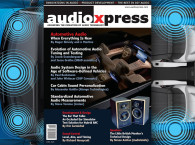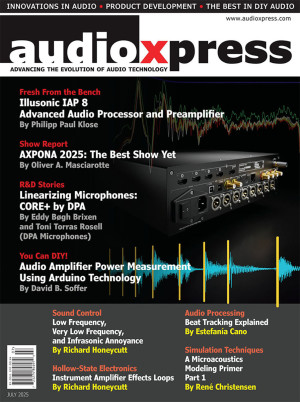 For the July 2025 issue of audioXpress, we have worked hard to offer a balanced combination of audio intelligence, practical knowledge, and great reads. Start by reading about Audio Vocabulary, and the process of picking words to describe emotions and auditory perception in this month's editorial by J. Martins, before diving straight into our engaging report of the AXPONA 2025 show. As Oliver A. Masciarotte and photographer Kurt Close flew through the more than 200 listening rooms on 12 floors to prepare a survey of what’s new and notable, they confirm everyone's impressions that it was a great show, probably the best AXPONA yet. More importantly, the Schaumburg show is attracting more members of the industry, with more product launches and technology demonstrations.
For the July 2025 issue of audioXpress, we have worked hard to offer a balanced combination of audio intelligence, practical knowledge, and great reads. Start by reading about Audio Vocabulary, and the process of picking words to describe emotions and auditory perception in this month's editorial by J. Martins, before diving straight into our engaging report of the AXPONA 2025 show. As Oliver A. Masciarotte and photographer Kurt Close flew through the more than 200 listening rooms on 12 floors to prepare a survey of what’s new and notable, they confirm everyone's impressions that it was a great show, probably the best AXPONA yet. More importantly, the Schaumburg show is attracting more members of the industry, with more product launches and technology demonstrations.And for the cover article this month, audioXpress is proud to feature a review of the Illusonic IAP 8, an advanced multichannel audio processor and preamplifier with HDMI, DSP, and proprietary multichannel processing. It does a whole lot more, but for this review, Philipp Paul Klose focused on the DSP and understanding the possibilities of the work by this company from Switzerland. This is one of the most sophisticated and higher-quality secret weapons in audio that is the direct result of deep expertise led by Christof Faller and his unique supplier network in Switzerland. The company offers a whole range of multichannel processors, and their expertise comes precisely from the company's extensive work for the audio and automotive industry in the signal processing field. Time to recognize Illusonic.
Also included in this issue is a short book review that Jan Didden wrote as Burkhard Vogel surprised us all with an extensively revised second edition of his book Slopes and Levels, Spice Models to Simulate Vintage Op-Amp Noise. The first edition was reviewed in audioXpress by fellow industry expert Marcel van de Gevel, just in March 2023 (and you can read it online). The second edition of Slopes and Levels adds 10 additional new chapters on the noise-relevant handling of input bias-current-compensated operational amplifiers!
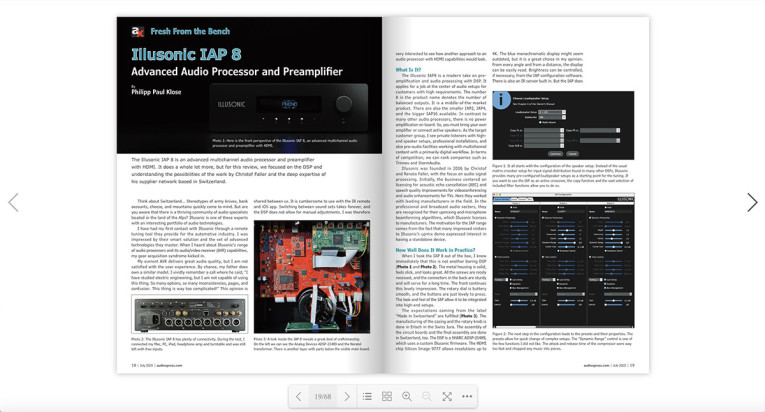
For this month's Sound Control column, Richard Honeycutt writes about the importance of low frequency, very low frequency, and infrasound annoyance. His article highlights the problems and potential causes of low frequency sounds (typically below 200Hz) and infrasound (sounds below 20Hz) at very high levels, and its potential effects on some individuals, causing significant annoyance and discomfort. The origins - natural and man-made - are also one of the most frequent causes of "noise pollution" and acoustic discomfort complaints, not always well understood and identified.
For the next article in this July 2025 issue of audioXpress, we feature a first contributed article by Estefanía Cano, chief scientist at AudioSourceRE and an AI/ML, Music, and Audio DSP specialist. In her debut under the header Audio Processing, she explains everything about beat tracking and how for years, music technologists have designed innumerable methods to automatically extract beats from music tracks, that are now a valuable technique for DJ mixing, content editing tools, and music recommendation systems for streaming platforms, among many other use cases. Read about the early attempts to create automatic beat trackers, and how those have now evolved into the sophisticated AI-based algorithms we find in many products today.
This month we also present an interesting report on the development of the DPA CORE+ technology at the heart of DPA's miniature microphones, written for audioXpress by Eddy Bøgh Brixen, Audio Specialist, and Toni Torras Rosell, Technology Manager, Acoustics, for DPA Microphones. Evolving over the previous CORE technology that essentially dramatically enhanced the dynamic range of the microphone, the patent-pending CORE+ by DPA eliminates the non-linearities typically generated by the membrane and electronic components, removing any trace of distortion from the microphone output. Improving even on the already extremely high standards of the Danish manufacturer, CORE+ sets a new standard for distortion-free microphone sound.
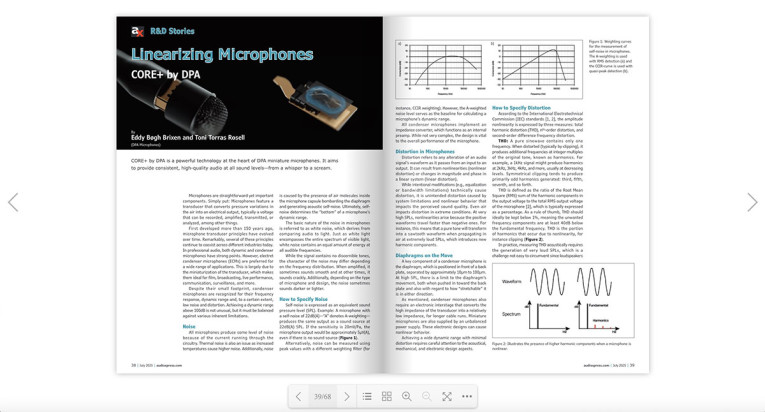
And as anticipated, in this issue there's also a deep dive by René Christensen on Microacoustics Modeling. In the first of his articles on the topic, he focuses on the inclusion of acoustic losses in small or narrow geometries, discussing various thermoviscous loss models, their characteristics, and limitations, emphasizing the importance of considering boundary layer thicknesses and frequency dependencies when choosing a model. The text categorizes these models into analytical and numerical approaches, highlighting their implementation methods and computational requirements.
And finally, for those particularly interested in practical build projects and/or testing power amplifier output, David B. Soffer offers a useful project using the affordable Arduino platform. Sharing a concept that he created out of pure necessity, he describes how to build a simple testing instrument that provides instantaneous power output readings, converting measured Volts to Watts with a specific load resistance as the output of the amplifier is changing.
And closing this issue, Richard Honeycutt explores the always fascinating topic of hollow-state guitar amplifiers, specifically the evolution of the circuits available in the guitar classics for instrument amplifier effects loops. From tremolo and reverb to the introduction of distortion, and the creation of distortion pedals and "fuzz boxes," we also discover why some effect devices are better when used in front of the amp or in the effects loop.
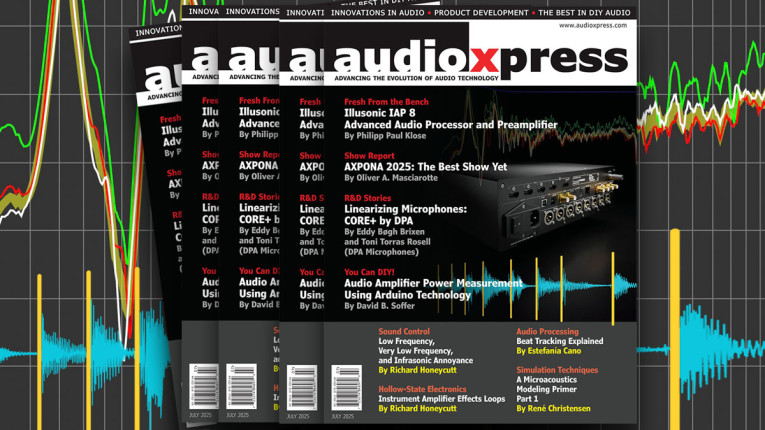
Please remember that all the content contained in every issue of audioXpress is the reason this publication continues to reinforce its role as an essential resource for the audio industry, month after month, 12 times per year. Your support and that of our advertisers is what allows us to keep this publication in print and on all the digital platforms as well as pay our independent authors and contributors for their work.
Subscribe if you haven't done so in order not to miss future issues or renew your subscription. Subscribing to the digital online version allows immediate access and is available here: audioXpress Subscription Services
If you wish to buy a single printed issue or the complete audioXpress archive on USB, from 2000 to 2025 (yes, including the latest issue), just visit our online shop at www.cc-webshop.com.
And check out the new options to access the audioXpress Digital archive:
https://simplecirc.com/subscribe/audioxpress
Don't miss out, get your copy of audioXpress right now at www.gotomyxpress.com



